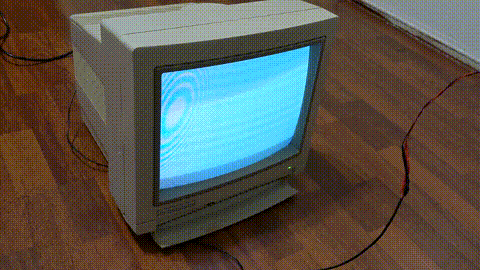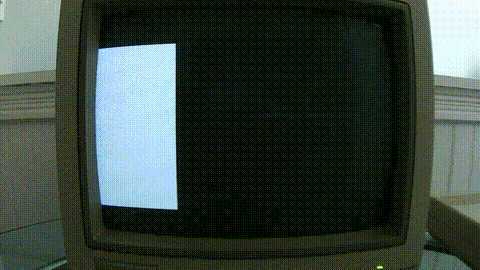Recording freespin
Getting a good recording of freespin was surprisingly tricky. (And we're still not quite happy how the sound came out, so we might redo it, in fact)
Recording an analog monitor
To record a CRT, you want your camera to run at exactly the monitor frame rate.
Running at the wrong frame rate will get you this kind of flickering:

Instead, you want this:

The released version of this demo generates frames at exactly 50Hz. We tried many different cameras that claim to be able to record 50Hz. The only we found that (kind off) pulled it off was this one.
But even that one: Turns out that it actually runs at 49.23Hz, and then occasionally skips a frame to get back to "50Hz". So we made a special version of freespin that instead runs at 49.23Hz, recorded that, and then sped it back up to 50Hz using ffmpeg. (And then combined it with the sound of a special version of freespin that had to run at 50.095Hz to compensate for the frames the camera dropped....)
That worked fine, and we have zero flicker in the recording. It took multiple attempts, since every time you start, the position of the raster beam (which you see as a bright horizontal bar) at the start of frame taking is stationary through the entire demo, and you want that in the off screen area.
Recording the music
For recording the music, we opened the drive, pointed a condenser microphone at it, and then enclosed that whole setup with a soundproof box:

Even with the soundproofing, it took around multiple attempts to get a decent recording. (Thanks, neighbor dog.)
We used a 1541 II, not a 1541, since we found the former to generate nicer sound.
As mentioned, we took two different audio recordings: One at 50Hz, and one at 50.095Hz, for the 1084 recording and the video capture.
A/D conversion was done by a USB soundcard, which also had the job of lowering the base:

In retrospect, it might have been cleaner to connect a guitar pickup directly to the stepper motor, and we might still try that. (It might distort the sound, though, whereas in the current recording, the sound is pretty close to what you hear when you put your ear next to a drive actually running freespin)